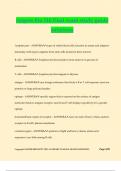Exam (elaborations)
rutgers bio 116 final exam study guide solutions
Copyright ©SOPHIABENNETT 2025 ACADEMIC YEARALL RIGHTS RESERVED. Page 1/29
rutgers bio 116 final exam study guide
solutions
lymphocytes - ANSWER-types of white blood cells; function in innate and adaptive
immunity; both types originate from stem cells located in bone marrow
B cells - ANSWER-ly...
[Show more]
Preview 3 out of 29 pages
Uploaded on
November 19, 2024
Number of pages
29
Written in
2024/2025
Type
Exam (elaborations)
Contains
Questions & answers
Institution
Rutgers
Module
Rutgers
£10.46
Also available in package deal from £32.66
100% satisfaction guarantee
Immediately available after payment
Both online and in PDF
No strings attached
Also available in package deal (1)
Rutgers Bundled Exams Questions and Answers 100% Pass Guaranteed.
1. Exam (elaborations) - rutgers bio 116 final exam study guide solutions
2. Exam (elaborations) - Rutgers dinosaurs exam 1 study guide solutions
3. Exam (elaborations) - Rutgers dynamics of healthcare exam study guide solutions
4. Exam (elaborations) - Rutgers gen bio 116 exam 1 study guide solutions
5. Exam (elaborations) - Rutgers general psychology exam 1 study guide solutions
6. Exam (elaborations) - Rutgers intro to management exam #2 study guide solutions
Show more
rutgers bio 116 final exam study guide




